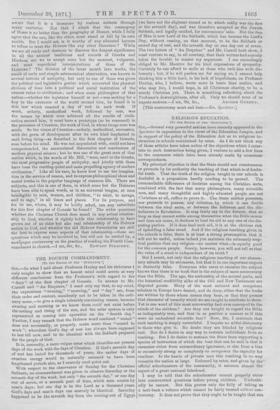THE FOURTH COMMANDMENT.
rro THE EDITOI O TRill 5PECTATOR:1
Sin,—In what I said about Professor•Huxley and his strictures I only sought to show that an honest mind could arrive at very 'different conclusions from the Professor's with regard to the
"
days" of the first chapter of Genesis. In answer to Mr. 'Carroll and "Au Enquirer," I need only say that, to my mind, the expressions "evening," "morning," and " day 11 are, from their order and context, manifestly not to he taken in the ordi- sassy sense,—to give a single tolerably convincing reason, because -evening and morning as we know them cottiti not exist before the setting and rising of the sun, and the solar system is only represented as coming into operation on the "fourth day." Farther, I may remark that the Hebrew word rendered "rested" does not necessarily, or properly, mean more than "ceased to work "; wherefore God's day of rest has always been eupposed to last till now, and to be identical with the Sabbath prepared
for the people of God. It is, assuredly, a mere vulgar error which identifies our present 'days of the week with the days of Creation. E God's seventh day 'of rest has lasted for thousands of years, the earlier days of creative energy would be naturally assumed to have been lengthened periods also, as I scarcely need point out. With respect to the observaoce of Sunday for the Christian Sabbath, no commandment was given to observe Saturday or the seventh day of the week, but only "the seventh day," or one day out of seven, or a seventh part of time, which man counts by man's days; but one day is to the Lord as a thousand years. 'God's days and man's days can scarcely be identical. Saturday happened to be the seventh day from the coming-out of Egypt (we have not the slightest record as to which reidly was the first or the seventh day), and was therefore accepted as the Jewish Sabbath, and legally ratified, for convenience' sake. But the Son of Man is now Lord of the Sabbath, which has become the Lord's Day, without ceasing, on that account, to be the Sabbath or sacred day of rest, and the seventh day or. one day out of seven. The two letters of "An Enquirer" and Mr. Carroll both show, I must venture to say, in all courtesy, that their writers had scarcely taken the trouble to master my argument. I am exceedingly obliged to Mr. Maurice for his kind expressions of sympathy. Certainly he can afford to smile at those who twit him with dis- honesty; but, if he will pardon me for saying so, I cannot help thinking him a little hard, in his lack of hopefulness, on Professor Huxley, who, I believe, wrote more in haste than malice, and who may live, I would hope, in all Christmas charity, to be a sturdy Christian yet. There is something refreshing about the Professor's downrightness, after all. Only we should none of us


































 Previous page
Previous page